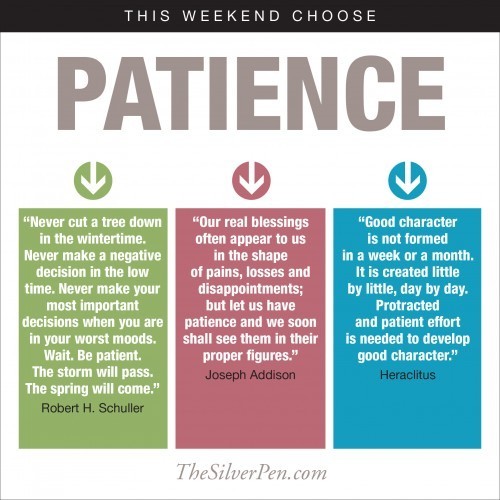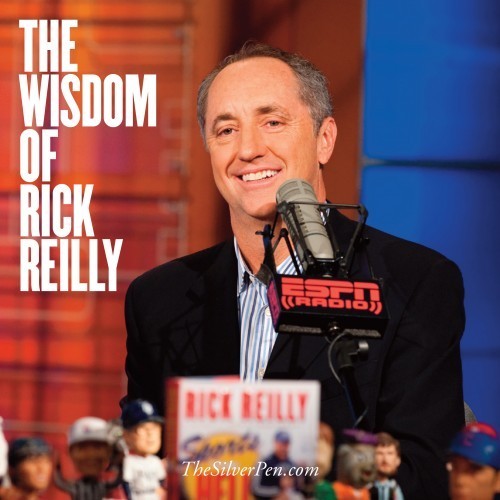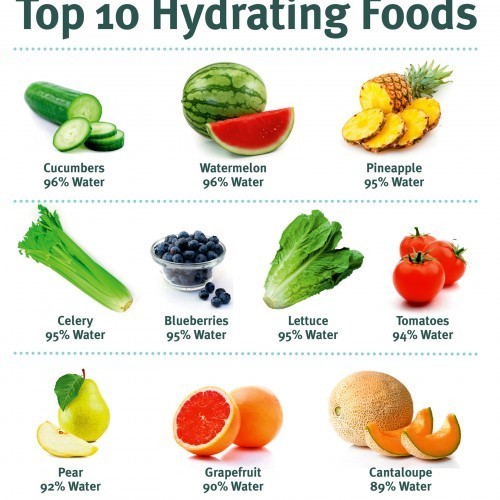Hollye Jacobs's Blog, page 16
July 25, 2014
This Weekend: Choose Patience


This Weekend: Choose Patience
The post This Weekend: Choose Patience appeared first on The Silver Pen.
Facebook: https://www.facebook.com/TheSilverPen
Twitter: https://twitter.com/hollyejacobs
Google Plus: https://plus.google.com/1042044534272...
July 23, 2014
Chemotherapy-Induced Neuropathy


Chemotherapy-Induced Neuropathy
After my taking Taxol, I experienced something called neuropathy. It is yet another example of the collateral damage that chemo does in its pursuit to eradicate FBC (or any kind of cancer for that matter). I know many (way too many!) people who have also experienced nasty neuropathy. The image above describes how it feels. I actually vacillated between feeling as though my fingertips were on fire or frozen. …really hard to describe unless you’ve been there (and of course I hope that you haven’t!).
Neuropathy is a general term for pain and numbness caused by damage to nerves in the peripheral nervous system. It can occur anytime after chemotherapy begins and typically starts in your toes and moves up into your legs, arms, and hands. Mine started just a few short days after I started the Taxol. Boy oh boy did it ever stun me (and just when I thought that nothing could shock me!).
ASCO (the American Society of Clinical Oncology) has done extensive research on neuropathy and has determined that sadly, there is no cure or medication that can prevent chemotherapy-associated neuropathy. Please, be warned: there are many medications on the market right now that are said to prevent neuropathy; however, they often have extensive side effects and can interfere with other cancer medicines. Ewwwww. This is NOT GOOD.
In light of this, ASCO’s new guidelines recommend NOT using medicines or supplements that say that they prevent neuropathy. These medications include:
acetyl-L carnitine (ALC)amifostine (brand names: Ethyol, Ethiofos)amitriptyline (brand names: Amitid, Amitril, Elavil, Endep)calcium/magnesiumdiethyldithio-carbamate (DDTC)glutathionenimodpine (brand names: Nimotop, Nymalize)Org 2766all-trans-retinoic acid (also called tretinoin) (brand name: Vesanoid)rhuLIF (recombinant human leukemia inhibitory factor)vitamin EThe bottom line is that the folks at ASCO believe that if there is no scientific evidence showing that a medication helps neuropathy then it is probably best to steer away from using it.
Now the Silver Lining is that there is ONE medication that ASCO has found enough supporting evidence to put on the recommendation list for chemotherapy-associated neuropathy. It is called Cymbalta. While Cymbalta is not a cure for chemotherapy-induced peripheral neuropathy, research does show that it does help slow the process down.
Here is the big, humongous caveat: please, don’t ever, under any circumstances take any medication without talking with your Oncologist. Each person’s treatment plan is unique. The last thing in the world that you would want is to have a drug counteract the hard work of the chemotherapy. Conversation is imperative and will be a great Silver Lining in your care.
The post Chemotherapy-Induced Neuropathy appeared first on The Silver Pen.
Facebook: https://www.facebook.com/TheSilverPen
Twitter: https://twitter.com/hollyejacobs
Google Plus: https://plus.google.com/1042044534272...
July 22, 2014
The Wisdom of Rick Reilly


The Wisdom of Rick Reilly
Legendary ESPN sports writer Rick Reilly wrote his last column on June 30, 2014. I thought I would share his article with all of you because it gave me goosebumps. And anytime I get goosebumps, I need to share them with you, dear readers! In his last article, Rick Reilly shares the wisdom he learned throughout his long and storied career in sports. Enjoy!
Heading for Home by Rick Reilly
“I am the son of a drunk, a man who was much too concerned with where his next whiskey was coming from than where I was going.
He didn’t discipline me. Didn’t advise me. Didn’t father me. Hell, most of the time he didn’t even know where I was. And my trembling mother was much too terrified of him and his sloppy temper slamming home to worry about what I was doing.
So when I got a regular byline in the town paper before my 21st birthday, I was as wild and unruly as the mop of hair on my head. I had a voice and a license to use it, but not one lesson in how. I hurt people just to make a name for myself. Just because I could.
My first beat was the Colorado women’s basketball team and I came out slashing. Until, one day, a retired coach named Sox Walseth came up to me. His hair was white, with matching caterpillar eyebrows, and he wore a cardigan. He put a hand on my shoulder and said, “Son, you’re not going to get very far writing articles like the one you did today. These people shouldn’t have to read the cheap shots you’re taking at them. You can do better than this.”
I looked right back at him, stuck out my bottom lip, and began to cry.
I was so starved for a father that this man I hardly knew was suddenly thrown into the job. I’m sure he was as confused about what was happening as I was, but he took me to his chest and hugged me.
As I sit here and write my last column as a sports writer, I see now how that moment changed my life.
Until then, I’d never thought about what it was to be a good man. Had no clue. Never considered it. But when I looked around, I saw that sports was full of men and women like that — disciplined, molded and dedicated to their teammates as much as they were to themselves.
I see now how I was raised by sports, how it became my second family, and how I learned at its feet every day.
I’d notice how Michael Jordan never appeared before us until his tie was tied, his $3,000 suit buttoned, his silk pocket square just so. From him, I learned professionalism.
I watched safe after safe fall on John Elway’s head — Super Bowl losses, divorce, the loss of his twin sister and his beloved dad — and yet he refused to allow himself one ounce of self-pity. From him, I learned grit.
I’d see how Jim Murray would get up out of his chair in the press box to greet each of the dozens of people who just wanted to shake the great sports writer’s hand, even though he could hardly see his chair, much less their hands. From him, I learned humility.
I wrote about the teammates of high school cross country runner Ben Comen, who would finish their 3-mile races and then double back out onto the course to run with Ben and his limping cerebral palsy gait. From them, I learned love.
I discovered the athletes of Middlebury College, who would pick up a severely handicapped fan named Butch, load him into the car and take him to every game, where they’d provide a hot dog, a Coke and a buddy. From them, I learned service.
Never let anyone tell you sports doesn’t matter. Never let them tell you it’s all about the wins, the losses and the stats. Sports is so much more than that. It’s your grandfather and you and the way a Sunday Bears game bonds you like Super Glue. It’s what you ask of yourself to break four hours in the marathon. It’s the way your softball buddies can still laugh about you hitting the ump instead of the cutoff man 30 years later.
Eventually, my father sobered up and I grew up. I came to understand the chance he’d given up and the one I’d been given. Sox Walseth died 10 years ago, but I hope he saw. I hope I did better.
So why leave the best job in the world after 36 years? To see what else is out there. To learn new lessons from new teachers. To live in Italy, make amends to my piano and never have to care about groin pulls again. True, I’m only 56, but I always did prefer writing short.
To borrow from Peyton Manning, it’s been my privilege to be your sports writer. If I’d have known so many people would reach out and say so many kind things, I’d have quit years ago. To be told by a young journalist that you were the reason she got into the business; to be told by a grieving son that you made his dying mother laugh; to be told by a reader that a column you wrote changed the direction of his life? It swells the heart.
You’ve been better to me than I deserve. No writer in history is more flawed than me, but it was never for lack of trying. It was always in my attempt to get to the truth, or to make it fun, or to make it add up to something meaningful to you.
Life’s circles are funny, aren’t they? This Sunday, the U.S. Open golf tournament wraps up, but for once, I won’t be there. Instead, for the first time in my life, I’ll be home with my kids on Father’s Day.”
Here is the link to the article: http://espn.go.com/espn/story/_/id/11049946/rick-reilly-last-column
The post The Wisdom of Rick Reilly appeared first on The Silver Pen.
Facebook: https://www.facebook.com/TheSilverPen
Twitter: https://twitter.com/hollyejacobs
Google Plus: https://plus.google.com/1042044534272...
July 18, 2014
Friday Fixin’s: Top 10 Hydrating Foods


Friday Fixin’s: Top 10 Hydrating Foods
Happy Summer! While I can’t complain about the beautiful weather in Santa Barbara… there are days (maybe only a few!) where it feels as if the heater is on blast outside! …and for the first time since I have lived here, it is actually humid. Not Midwest humid, but sticky nonetheless. Regardless of where you are contending with the summer heat, it is EXTREMELY important to remain throughly hydrated. To function properly and remain energized your body needs an ongoing supply of water throughout the day.
The Silver Lining is that you do not have to continuously gulp tall glasses of water all day long for your body to have enough supply of hydration. There are many types of foods that can help supply your daily need of water.
So what types of water should you eat? Well, cucumber and watermelon (one of my favorites!) are both fantastic foods to snack on during the hot summer days. Both are made up of about 96% of water and are a great source of vitamins A, C, and B. AND they taste great. Blueberries, celery, pineapple, grapefruit, and many more make it possible to EAT some of your daily supply of water!
Stay hydrated this summer and remember that water is not the only way to get your daily source of hydration!
The post Friday Fixin’s: Top 10 Hydrating Foods appeared first on The Silver Pen.
Facebook: https://www.facebook.com/TheSilverPen
Twitter: https://twitter.com/hollyejacobs
Google Plus: https://plus.google.com/1042044534272...
This Weekend: Choose Travel


This Weekend: Choose Travel
The post This Weekend: Choose Travel appeared first on The Silver Pen.
Facebook: https://www.facebook.com/TheSilverPen
Twitter: https://twitter.com/hollyejacobs
Google Plus: https://plus.google.com/1042044534272...
July 16, 2014
Bottom Line Health Webcast Thursday, July 17th


Bottom Line Health
As I have said oh so many times here and in my book, if you or a loved one is struggling with the total bummer news of a cancer diagnosis, YOU ARE NOT ALONE. This is often so hard for people to understand. Heaven knows that I felt totally alone after my diagnosis. The Silver Lining is knowing that you are not alone and seeking support!
Recently I had the great opportunity to sit down with Bottom Line/Health for a video webcast to discuss my personal and professional experiences managing my diagnosis, treatment and recovery. The webcast is FREE will be available this Thursday, July 17, at 3:00pm (EDT). Here is the link to register for the event: http://www.bottomlinepublications.com/chats
Hope that you will join us!
The post Bottom Line Health Webcast Thursday, July 17th appeared first on The Silver Pen.
Facebook: https://www.facebook.com/TheSilverPen
Twitter: https://twitter.com/hollyejacobs
Google Plus: https://plus.google.com/1042044534272...
July 14, 2014
Job vs Vocation


Job vs Vocation
For years, I had jobs: jobs selling clothes, jobs selling food, jobs delivering papers, jobs as an assistant. They never filled my heart and soul, though the Silver Lining is that they did pay the bills. It wasn’t until I started doing hospice nursing and social work that I truly understood the meaning of a vocation. I was inherently drawn to this work and felt (with every cell of my being) that I was meant to do it. Though the work was incredibly challenging and often painful (after all, people were dying), I was inspired each and every day to continue.
My dear friend Kathy Freston wrote an article on her blog The Daily Lean that beautifully summarizes the difference between a job and vocation. It is also a beautiful encouragement to help you find your own vocation.
Job vs. Vocation by Kathy Freston
What’s the thing that lights you up from within, the passion that stirs you to action? What’s the thing that you could spend hours/days/weeks thinking about or working on without realizing the passage of time? What’s the thing that confounds you, that makes you so crazy to see (but that you can’t stop seeing even in your sleep)? What’s the injustice or insight that has a hold on you, beckoning your obsession? This is your calling, your mission, your deepest joy and satisfaction. It’s the thing that would have you be intensely present and inspired and excited should you follow through with your continued attention.
(A note here: If you don’t feel any stirring on this, don’t worry; it will come…just stay alert, engaged, and receptive with whatever you’re doing. And if you are just a little too devoted to “having a good time”, know that simple fun without depth does not make a fulfilling life…)
If you’ve been doing only what you “should” be doing in your life (holding down the job you don’t like or suppressing an interest because you don’t have time to indulge) doorways (into your own psyche and into worldly opportunities) will remain closed to you. You won’t even see them, actually. You’ll feel you’re living a half-life, contracted, like the light has drained out of you (and it will indeed have done so).
If, however, you begin to breathe some effort into that budding passion, the whole world will begin to magically open up to you. Doorways will appear, windows of light will open. All kinds of unexpected assistance will show up. You’ll have ideas, prospects, and synchronicities that will lead you to the next right step. And those steps will lead you to into a passionate life, a rich and purposeful existence. You’ll meet people with whom you feel a profound kinship, and you’ll cultivate a wisdom and creativity that will lead you to be highly effective. This doesn’t mean you should abandon your (mundane) responsibilities, but you can nurture that thing that’s tugging on your consciousness. That tug is your true vocation, and if you don’t focus on it, we all lose out on what you could have done.
The post Job vs Vocation appeared first on The Silver Pen.
Facebook: https://www.facebook.com/TheSilverPen
Twitter: https://twitter.com/hollyejacobs
Google Plus: https://plus.google.com/1042044534272...
July 11, 2014
This Weekend: Choose Creativity


This Weekend: Choose Creativity
The post This Weekend: Choose Creativity appeared first on The Silver Pen.
Facebook: https://www.facebook.com/TheSilverPen
Twitter: https://twitter.com/hollyejacobs
Google Plus: https://plus.google.com/1042044534272...
July 7, 2014
The Attention Economy


I stumbled across this article written by Tom Chatfield on the Daily Good and it really hit home with me. For the past 4 months, I have been on technical OVERLOAD. Too much, all the time. I literally feel like I have a nasty case of ADHD. I have the hardest time focusing and am so easily distracted. If it sounds familiar, read this article! Tom generously allowed me to share the article here with you. Read it and prepared to be inspired to step away from
The Attention Economy by Tom Chatfield
How many other things are you doing right now while you’re reading this piece? Are you also checking your email, glancing at your Twitter feed, and updating your Facebook page? What five years ago David Foster Wallace labelled ‘Total Noise’ — ‘the seething static of every particular thing and experience, and one’s total freedom of infinite choice about what to choose to attend to’ — is today just part of the texture of living on a planet that will, by next year, boast one mobile phone for each of its seven billion inhabitants. We are all amateur attention economists, hoarding and bartering our moments — or watching them slip away down the cracks of a thousand YouTube clips.
If you’re using a free online service, the adage goes, you are the product. It’s an arresting line, but one that deserves putting more precisely: it’s not you, but your behavioural data and the quantifiable facts of your engagement that are constantly blended for sale, with the aggregate of every single interaction (yours included) becoming a mechanism for ever-more-finely tuning the business of attracting and retaining users.
Consider the confessional slide show released in December 2012 by Upworthy, the ‘website for viral content’, which detailed the mechanics of its online attention-seeking. To be truly viral, they note, content needs to make people want to click on it and share it with others who will also click and share. This means selecting stuff with instant appeal — and then precisely calibrating the summary text, headline, excerpt, image and tweet that will spread it. This in turn means producing at least 25 different versions of your material, testing the best ones, and being prepared to constantly tweak every aspect of your site. To play the odds, you also need to publish content constantly, in quantity, to maximise the likelihood of a hit — while keeping one eye glued to Facebook. That’s how Upworthy got its most viral hit ever, under the headline ‘Bully Calls News Anchor Fat, News Anchor Destroys Him On Live TV’, with more than 800,000 Facebook likes and 11 million views on YouTube.
But even Upworthy’s efforts pale into insignificance compared with the algorithmic might of sites such as Yahoo! — which, according to the American author and marketer Ryan Holiday, tests more than 45,000 combinations of headlines and images every five minutes on its home page. Much as corporations incrementally improve the taste, texture and sheer enticement of food and drink by measuring how hard it is to stop eating and drinking them, the actions of every individual online are fed back into measures where more inexorably means better: more readers, more viewers, more exposure, more influence, more ads, more opportunities to unfurl the integrated apparatus of gathering and selling data.
Attention, thus conceived, is an inert and finite resource, like oil or gold: a tradable asset that the wise manipulator auctions off to the highest bidder, or speculates upon to lucrative effect. There has even been talk of the world reaching ‘peak attention’, by analogy to peak oil production, meaning the moment at which there is no more spare attention left to spend.
This is one way of conceiving of our time. But it’s also a quantification that tramples across other, qualitative questions — a fact that the American author Michael H Goldhaber recognised some years ago, in a piece for Wired magazine called ‘Attention Shoppers!’ (1997). Attention, he argued, ‘comes in many forms: love, recognition, heeding, obedience, thoughtfulness, caring, praising, watching over, attending to one’s desires, aiding, advising, critical appraisal, assistance in developing new skills, et cetera. An army sergeant ordering troops doesn’t want the kind of attention Madonna seeks. And neither desires the sort I do as I write this.’
For all the sophistication of a world in which most of our waking hours are spent consuming or interacting with media, we have scarcely advanced in our understanding of what attention means. What are we actually talking about when we base both business and mental models on a ‘resource’ that, to all intents and purposes, is fabricated from scratch every time a new way of measuring it comes along?
In Latin, the verb attendere — from which our word ‘attention’ derives — literally means to stretch towards. A compound of ad(‘towards’) and tendere (‘to stretch’), it invokes an archetypal image: one person bending towards another in order to attend to them, both physically and mentally.
Attending is closely connected to anticipation. Soldiers snap to attention to signify readiness and respect — and to embody it. Unable to read each others’ minds, we demand outward shows of mental engagement. Teachers shout ‘Pay attention!’ at slumped students whose thoughts have meandered, calling them back to the place they’re in. Time, presence and physical attentiveness are our most basic proxies for something ultimately unprovable: that we are understood.
The best teachers, one hopes, don’t shout at their students — because they are skilled at wooing as well as demanding the best efforts of others. For the ancient Greeks and Romans, this wooing was a sufficiently fine art in itself to be the central focus of education. As the manual on classical rhetoric Rhetorica ad Herennium put it 2,100 years ago: ‘We wish to have our hearer receptive, well-disposed, and attentive (docilem, benivolum, attentum).’ To be civilised was to speak persuasively about the things that mattered: law and custom, loyalty and justice.
This vision of puppeteers effortlessly pulling everyone else’s strings — however much it might fulfil both geek fantasies and Luddite nightmares — is distinctly dubious
Underpinning this was neither honour nor idealism, but pragmatism embodied in a five-part process. Come up with a compelling proposition, arrange its elements in elegant sequence, polish your style, commit the result to memory or media, then pitch your delivery for maximum impact. Short of an ancient ‘share’ button, the similarities to Upworthy’s recipe for going viral are impressive. Cicero, to whom Rhetorica ad Herennium is traditionally attributed, also counted flattery, bribery, favour-bargaining and outright untruth among the tools of his trade. What mattered was results.
However, when it comes to automated systems for garnering attention, there’s more at play than one person listening to another; and the processes of measurement and persuasion have some uncannily totalising tendencies. As far as getting the world to pay attention to me online, either I play by the rules of the system — likes, links, comments, clicks, shares, retweets — or I become ineligible for any of its glittering prizes. As the American writer and software engineer David Auerbach put it in n+1 magazine, in a piece pointedly titled ‘The Stupidity of Computers’ (2012), what is on screen demands nothing so much as my complicity in its assumptions:
Because computers cannot come to us and meet us in our world, we must continue to adjust our world and bring ourselves to them. We will define and regiment our lives, including our social lives and our perceptions of our selves, in ways that are conducive to what a computer can ‘understand’. Their dumbness will become ours.
In computing terms, to do things in a way the system does not ‘understand’ is to do nothing at all. It is to be incomprehensible, absurd, like trying to feed a banana instead of paper into a printer. What counts is synonymous with what’s being counted.
All of which seems to place immense power, not to mention responsibility, into the hands of the system architects: the coders, designers, advertisers, professional media manipulators and social media gurus devoted to profitable clicking.
Yet this vision of puppeteers effortlessly pulling everyone else’s strings — however much it might fulfil both geek fantasies and Luddite nightmares — is distinctly dubious. As the British economist Charles Goodhart argued in 1975 in an aphorism that has come to be known as Goodhart’s law, ‘When a measure becomes a target, it ceases to be a good measure.’ There are few better summaries of the central flaw in attention economics. Attention-engineers are effectively distributing printing presses for a private currency — and with everyone else desperate to churn out as much as possible, by any means possible, what’s going on is more a chaotic scramble for advantage than a rational trade in resources.
No matter how cunning the algorithms and filters, entire industries of manufactured attention bloom and fade around every possibility of profit. As recent investigations have suggested, achievements in the field range from ‘click farms’ of low-paid workers churning out ersatz engagement to paid endorsements from social media celebrities, via bulk-purchased followers and fake grassroots activists. Every target is continually being moved, refined and undermined. Nobody is in control.
And who is to say that they should be? Seeing data writ large, relations spelt out and chains of consequence snaked brightly across the recorded realm, we confuse information with mastery. Yet this is at best a category error, and at worst a submission to wishful bullshit: a mix of convenient propaganda and comforting self-deception that hails new kinds of agency, without pausing to acknowledge the speciousness of much of what’s on offer.
In the preface to his essay collection Tremendous Trifles (1909), the English author, ontologist and professional paradox-weaver G K Chesterton told the fable of two boys who were each granted a wish. One chose to become a giant, and one to become extremely small. The giant, to his surprise, found himself bored by the shrunken land beneath him. The tiny boy, however, set off gladly to explore the endless world of wonders his front garden had become. The moral, as Chesterton saw it, was one of perspective:
If anyone says that I am making mountains out of molehills, I confess with pride that it is so. I can imagine no more successful and productive form of manufacture than that of making mountains out of molehills… I have my doubts about all this real value in mountaineering, in getting to the top of everything and overlooking everything. Satan was the most celebrated of Alpine guides, when he took Jesus to the top of an exceeding high mountain and showed him all the kingdoms of the earth. But the joy of Satan in standing on a peak is not a joy in largeness, but a joy in beholding smallness, in the fact that all men look like insects at his feet.
There’s a similarly reductive exaltation in defining attention as the contents of a global reservoir, slopping interchangeably between the brains of every human being alive. Where is the space, here, for the idea of attention as a mutual construction more akin to empathy than budgetary expenditure — or for those unregistered moments in which we attend to ourselves, to the space around us, or to nothing at all?
If contentment and a sense of control are partial measures of success, many of us are selling ourselves far too cheap
From the loftiest perspective of all, information itself is pulling the strings: free-ranging memes whose ‘purposes’ are pure self-propagation, and whose frantic evolution outstrips all retrospective accounts. This is the mountaintop view of Chesterton’s Satan, whispering in a browser’s ear: consider yourself as interchangeable as the button you’re clicking, as automated as the systems in which you’re implicated. Seen from such a height, you signify nothing beyond your recorded actions.
Like all totalising visions, it’s at once powerful and — viewed sufficiently closely — ragged with illusions. Zoom in on individual experience, and something obscure from afar becomes obvious: in making our attentiveness a fungible asset, we’re not so much conjuring currency out of thin air as chronically undervaluing our time.
We watch a 30-second ad in exchange for a video; we solicit a friend’s endorsement; we freely pour sentence after sentence, hour after hour, into status updates and stock responses. None of this depletes our bank balances. Yet its cumulative cost, while hard to quantify, affects many of those things we hope to put at the heart of a happy life: rich relationships, rewarding leisure, meaningful work, peace of mind.
What kind of attention do we deserve from those around us, or owe to them in return? What kind of attention do we ourselves deserve, or need, if we are to be ‘us’ in the fullest possible sense? These aren’t questions that even the most finely tuned popularity contest can resolve. Yet, if contentment and a sense of control are partial measures of success, many of us are selling ourselves far too cheap.
Are you still paying attention? I can look for signs, but in the end I can’t control what you think or do. And this must be the beginning of any sensible discussion. No matter who or what tells you otherwise, you have the perfect right to ignore me — and to decide for yourself what waits in each waking moment.
The post The Attention Economy appeared first on The Silver Pen.
Facebook: https://www.facebook.com/TheSilverPen
Twitter: https://twitter.com/hollyejacobs
Google Plus: https://plus.google.com/1042044534272...
July 4, 2014
5 Ways To Teach Kids About July 4th


 5 Ways To Teach Kids About July 4th
5 Ways To Teach Kids About July 4th
Happy Fourth of July everyone!! Excitedly Eight happens to love history (the apple didn’t fall far from the tree!); however, when we started talking about the 4th of July, I realized that she didn’t know much about it. The truth is that many young children (and maybe a handful of adults too!) don’t know the meaning behind this special holiday. It’s so easy to think that it is just a celebration in the middle of the year with hot picnics, fire works, sparklers, and the colors red-white-and blue. Or maybe they think it’s just a reminder that Christmas is less than 6 months away (as I did when I was a child). Well, here are 5 ways to change that!
Talk with kids about American ideals. Ask them “What does Independence Day mean?” Many times they will give a simple answer such as “The day America became free!” or they won’t know what to say at all. This is the opportunity for you to give them some great reasons to love their country, on the Fourth and all year round.Explain what Independence Day is. Tell them that it is our country’s birthday. On July 4, 1776, our country’s leaders declared independence from Great Britain, meaning they no longer had to do what Great Britain said. At the time, this was extremely dangerous because Great Britain had a huge army and anyone that went against the King was punishable by death. Yet, the American’s fought against Great Britain and won the Revolutionary War, which gave them the freedom to govern themselves.Explain the American Flag. Point out a nearby American Flag (there has to one around somewhere… after all it is July 4th!!) and explain the significance of each part of the flag to them. The 50 white stars stand for the 50 states in America. The 13 stripes stand for the 13 British colonies, which declared their independence on July 4, 1776. Explain to them that the American flag is a symbol to the world of our freedom and independence and that each state within America is on the same team. Therefore, we treat the flag with respect.Tell them what they can do for their country. America is like family -everyone has to pitch in with the work to keep everything running smoothly. This means that as an American citizens we have certain responsibilities like voting, obeying the law, paying taxes, and going to school. Explain to them how being a good citizen means they should also take care of their country. They can do this by keeping it clean, staying informed about problems America faces, and looking out for people in trouble. They can also do this by volunteering their time at the local homeless shelter or getting involved in other community service projects.Explain the difference between America and other countries. Some like to call America the “melting pot.” This is because there are so many different people from all over the world that live in America. Why is this? Because American freedoms have inspired people everywhere to come to this land and pursue their dreams freely. Present examples of other countries such as China or Syria that do not have the same freedoms as Americans do. This may be a good time to discuss your own family history and tell your kids how your ancestors came to America.I hope these 5 simple guidelines help you instill in kids the great importance of this holiday. Have a wonderful day with friends and family!
The post 5 Ways To Teach Kids About July 4th appeared first on The Silver Pen.
Facebook: https://www.facebook.com/TheSilverPen
Twitter: https://twitter.com/hollyejacobs
Google Plus: https://plus.google.com/1042044534272...



